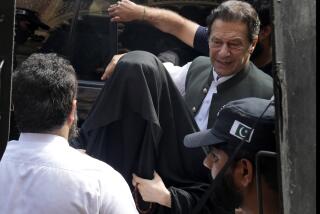Pakistan’s former leader Musharraf indicted on treason charges
ISLAMABAD, Pakistan -- Former military ruler Pervez Musharraf was indicted on treason charges on Monday in a bold assertion of authority by Pakistan’s civilian government, which has historically been marginalized by the nation’s powerful military.
Musharraf pleaded not guilty to the charges brought by a special court in Islamabad over his decision to impose a nationwide state of emergency in 2007, which critics said subverted the constitution. It marks the first time a Pakistani military leader has ever been tried for abuse of power.
The retired general, 70, told the court that he did not violate the constitution and issued a strident defense of his public service, including 45 years in the military and nine years as chief of army staff. “I have fought two wars and it is treason?” he said.
Musharraf had remained absent from most of the hearings in the special tribunal owing to security threats and what his lawyers described as ill health. When he defied expectations and appeared before the court Monday, more than 2,000 security personnel were dispatched to safeguard his 12-mile journey from a military hospital in Rawalpindi to Islamabad.
The indictment, which carries a potential death sentence if Musharraf is convicted, was the latest twist in a drama that has gripped Pakistan since he returned to the country in 2013 to relaunch his political career. Five years earlier, he fled Pakistan under threat of impeachment, abdicating the office he had held since seizing power in a 1999 coup.
The chief prosecutor in the case told the court that Musharraf “violated his military oath and took part in politics” when he declared the emergency and fired high-ranking judges in an attempt to hold onto power in late 2007.
Whether Musharraf will appear again in court remains to be seen. His lawyers have asked for permission for the former leader to travel abroad to visit his ailing mother as well as to obtain medical treatment himself. Musharraf is said to suffer from blocked arteries, a spinal cord problem and hypertension.
The special court has said it could not rule on the matter. “The court in its decision has left it on the government to allow Musharraf to travel abroad or not,” said Athar Minallah, a constitutional lawyer.
The government so far has been cool to the request.
The trial has been a priority of Pakistani Prime Minister Nawaz Sharif, who was in power in 1999 when Musharraf staged the coup, locking Sharif in prison on disputed charges and forcing him into exile. Sharif resumed office last year and has managed to reassert some government authority over the military, but political analysts predicted that the army would not allow Musharraf to face the indignity of a treason trial.
“My guess is Musharraf will be out of the country soon,” said Moeed Yusuf, director of South Asia programs at the United States Institute for Peace, a nonpartisan Washington think tank.
“The current military top brass, I think, has sent enough signals to say that they are not going to let Musharraf go down fighting. But this has gone too far for the prime minister to take a U-turn – politics doesn’t allow it, and the courts won’t allow it.”
Twitter: @SBengali
Special correspondent Sahi reported from Islamabad and Times staff writer Bengali from Kabul, Afghanistan.
More to Read
Start your day right
Sign up for Essential California for news, features and recommendations from the L.A. Times and beyond in your inbox six days a week.
You may occasionally receive promotional content from the Los Angeles Times.






